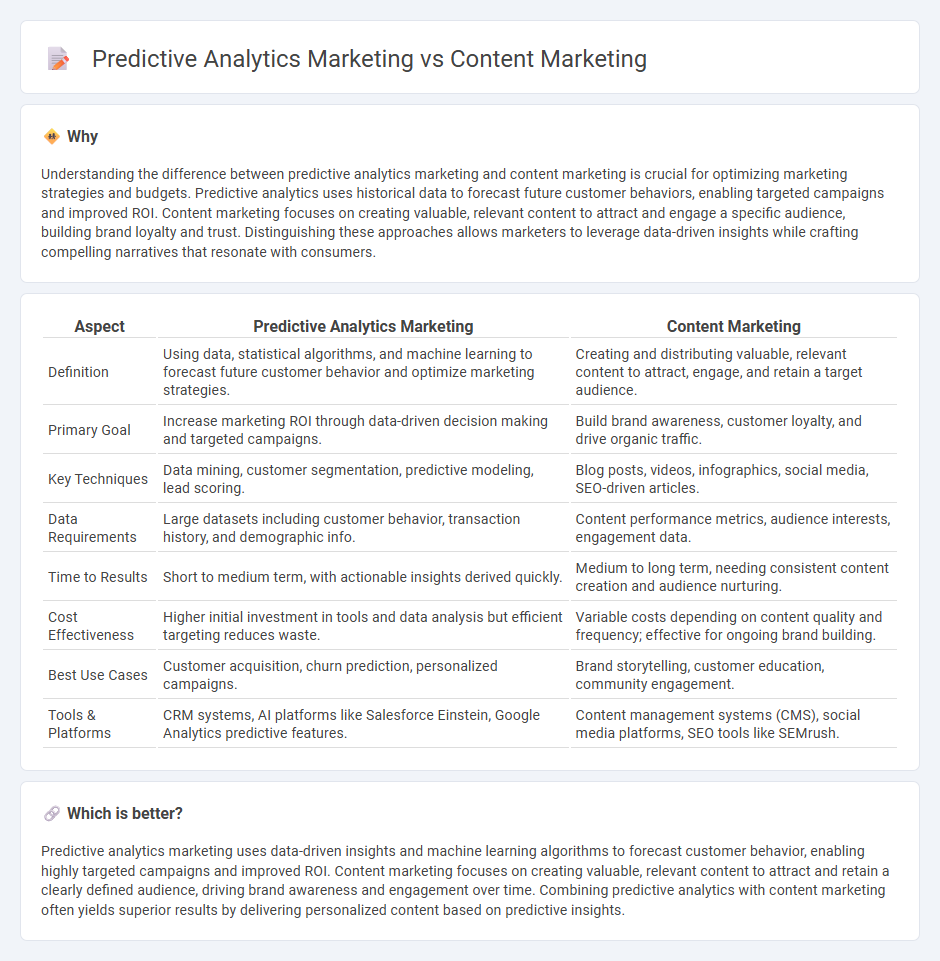
Predictive analytics marketing leverages data, machine learning, and statistical algorithms to forecast consumer behavior and optimize marketing campaigns for higher conversion rates. Content marketing focuses on creating and distributing valuable, relevant content to attract and retain a defined audience, fostering long-term brand loyalty. Discover how combining these strategies can transform your marketing success.
Why it is important
Understanding the difference between predictive analytics marketing and content marketing is crucial for optimizing marketing strategies and budgets. Predictive analytics uses historical data to forecast future customer behaviors, enabling targeted campaigns and improved ROI. Content marketing focuses on creating valuable, relevant content to attract and engage a specific audience, building brand loyalty and trust. Distinguishing these approaches allows marketers to leverage data-driven insights while crafting compelling narratives that resonate with consumers.
Comparison Table
| Aspect | Predictive Analytics Marketing | Content Marketing |
|---|---|---|
| Definition | Using data, statistical algorithms, and machine learning to forecast future customer behavior and optimize marketing strategies. | Creating and distributing valuable, relevant content to attract, engage, and retain a target audience. |
| Primary Goal | Increase marketing ROI through data-driven decision making and targeted campaigns. | Build brand awareness, customer loyalty, and drive organic traffic. |
| Key Techniques | Data mining, customer segmentation, predictive modeling, lead scoring. | Blog posts, videos, infographics, social media, SEO-driven articles. |
| Data Requirements | Large datasets including customer behavior, transaction history, and demographic info. | Content performance metrics, audience interests, engagement data. |
| Time to Results | Short to medium term, with actionable insights derived quickly. | Medium to long term, needing consistent content creation and audience nurturing. |
| Cost Effectiveness | Higher initial investment in tools and data analysis but efficient targeting reduces waste. | Variable costs depending on content quality and frequency; effective for ongoing brand building. |
| Best Use Cases | Customer acquisition, churn prediction, personalized campaigns. | Brand storytelling, customer education, community engagement. |
| Tools & Platforms | CRM systems, AI platforms like Salesforce Einstein, Google Analytics predictive features. | Content management systems (CMS), social media platforms, SEO tools like SEMrush. |
Which is better?
Predictive analytics marketing uses data-driven insights and machine learning algorithms to forecast customer behavior, enabling highly targeted campaigns and improved ROI. Content marketing focuses on creating valuable, relevant content to attract and retain a clearly defined audience, driving brand awareness and engagement over time. Combining predictive analytics with content marketing often yields superior results by delivering personalized content based on predictive insights.
Connection
Predictive analytics marketing leverages data models to forecast consumer behavior, optimizing content marketing strategies by delivering personalized and relevant content to target audiences. Integrating predictive analytics enables marketers to identify trending topics and customer preferences, enhancing content creation and distribution effectiveness. This synergy increases engagement rates, reduces marketing costs, and drives higher ROI through data-driven decision making.
Key Terms
Content Marketing:
Content marketing leverages strategic creation and distribution of valuable, relevant content to attract and engage target audiences, enhancing brand awareness and customer loyalty. It prioritizes storytelling and audience insights to build authentic connections that drive organic traffic and conversions. Explore how content marketing can transform your customer engagement and ROI strategies by diving deeper into its techniques and benefits.
Storytelling
Content marketing leverages storytelling to engage audiences by creating relatable narratives that build brand loyalty and trust. Predictive analytics marketing uses data-driven insights to forecast consumer behavior and tailor content for maximum impact. Explore how integrating storytelling with predictive analytics can elevate your marketing strategy.
Audience Engagement
Content marketing drives audience engagement by delivering valuable, relevant information tailored to customer interests and behaviors, fostering brand loyalty and trust. Predictive analytics marketing enhances audience engagement through data-driven insights that anticipate customer needs and personalize messaging for higher conversion rates. Explore how combining these strategies can optimize your marketing efforts and deepen audience connection.
Source and External Links
What is Content Marketing? A Beginners Guide - Content marketing is the strategic creation and distribution of valuable, relevant content designed to attract and engage your target audience, focusing on building trust, educating, and driving profitable customer actions rather than pushing traditional advertisements.
What is Content Marketing? Definition, Examples & Benefits - Content marketing involves creating and distributing consistent, valuable content with an audience-first approach that emphasizes education over promotion to build brand affinity, trust, and ultimately drive business growth.
What Is Content Marketing? - Content marketing is a strategic marketing approach focused on offering relevant and consistent content to attract, retain, and build loyalty with a defined audience, helping them solve problems while driving profitable customer actions.
 dowidth.com
dowidth.com